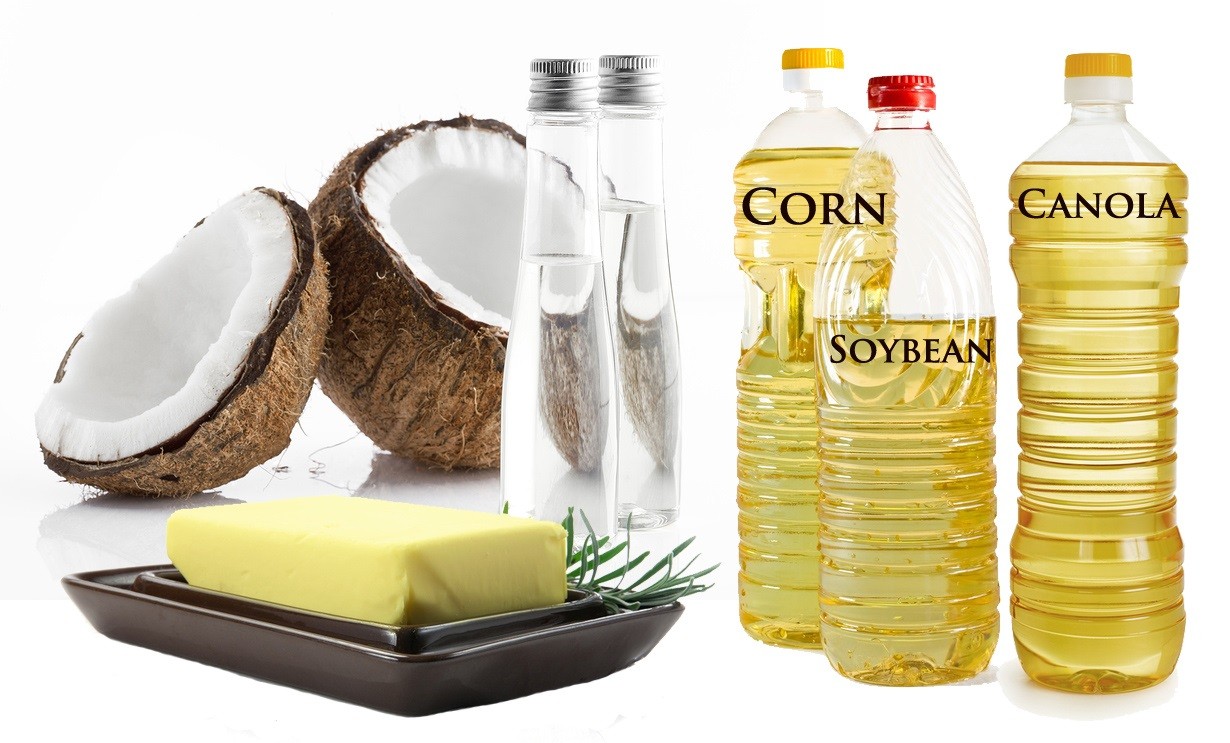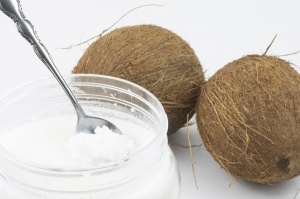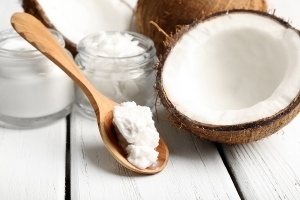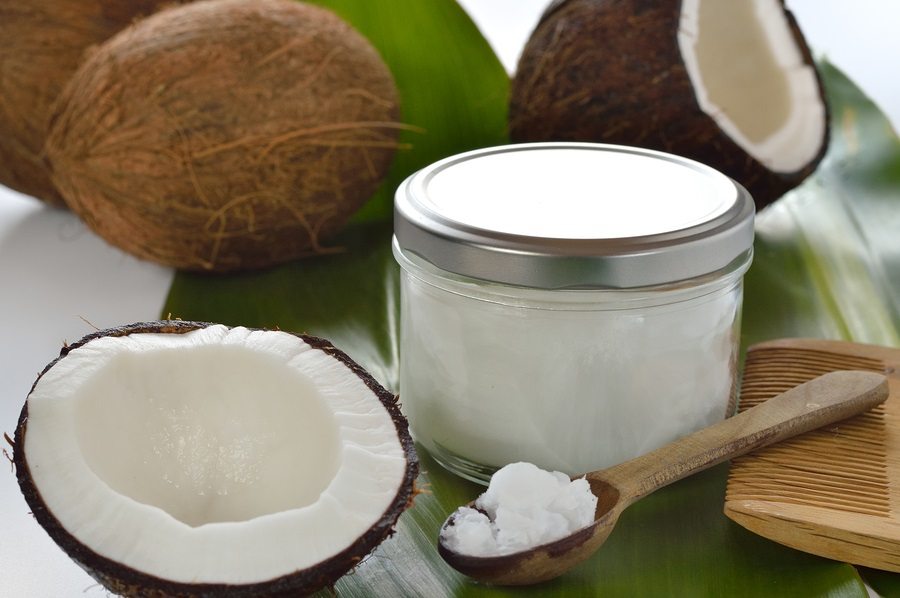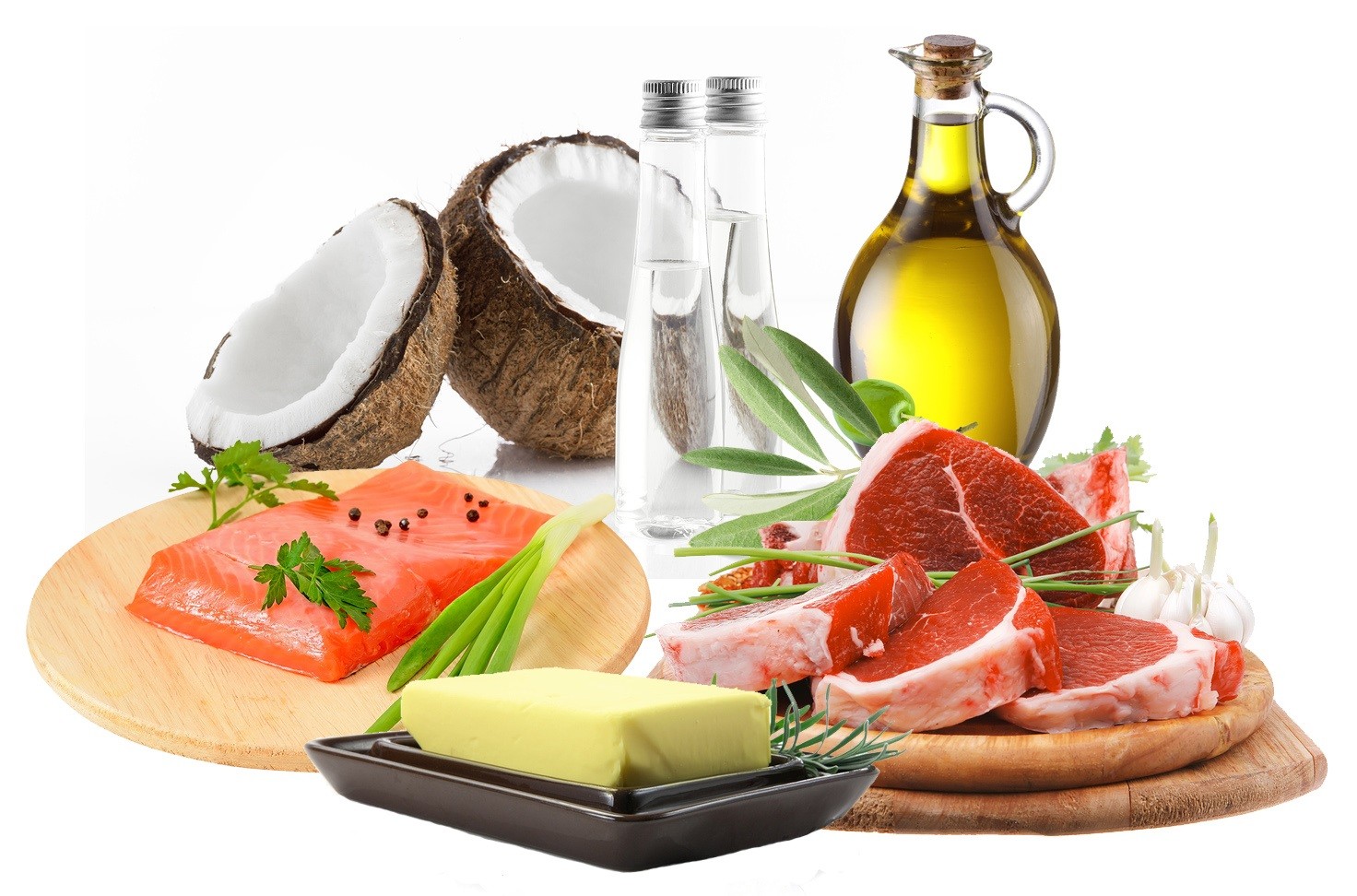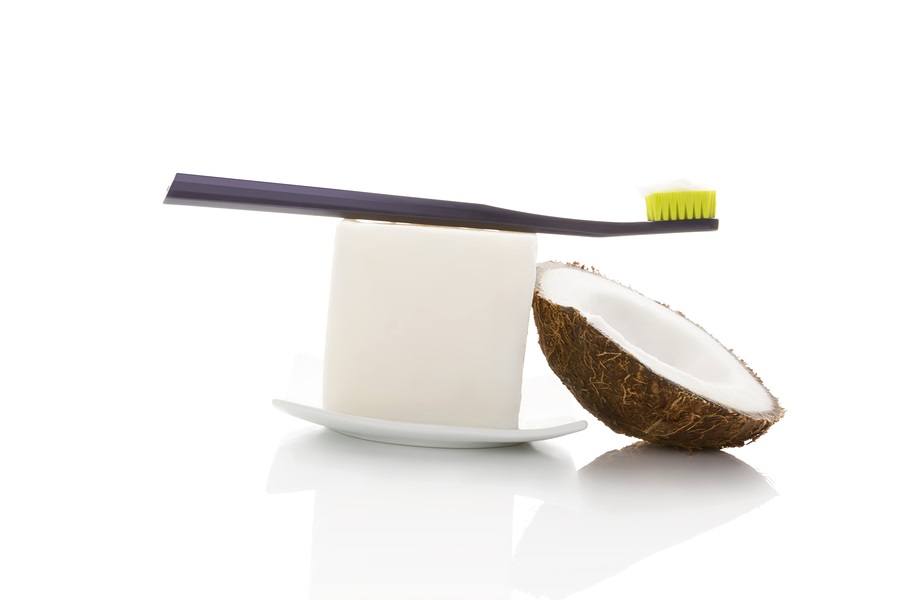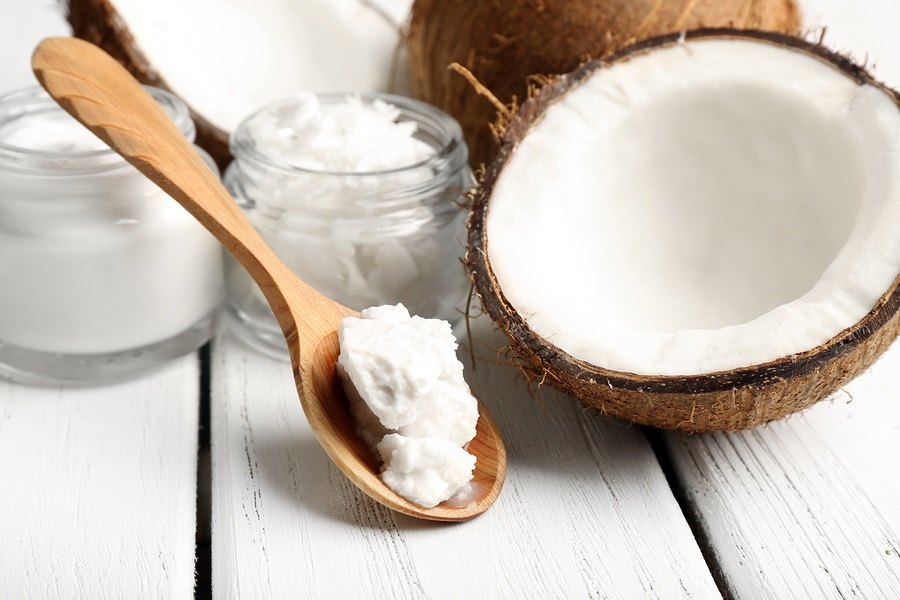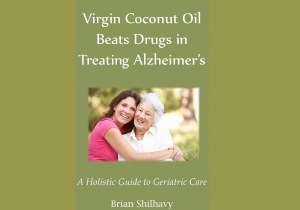Much maligned for years as a saturated fat, we’ll bring you truth regarding the incredible health properties of coconut oil.
Study: High Saturated Fat Diet with Coconut Oil Reduces Gut Bacteria in Crohn’s Disease
A recent 2017 study has determined that pure dietary saturated fats, especially coconut oil, can ease the suffering from inflammatory bowel diseases such as Crohn’s disease. This study was conducted at Case Western Reserve University in Cleveland, Ohio, a private institution well known for independent research. The study was reported in Science Daily June 22, 2017. Mice were fed only plant based fats such as cocoa butter and coconut oil. The mice fed coconut oil or cocoa butter had fewer kinds of gut bacteria. Their gut microbiome content had been positively altered to a healthier balance by 30 percent.
Study: Vegetable Oils Contribute to Fatty Liver Disease – Saturated Fats Do Not
Nonalcoholic fatty liver disease (NAFLD) is rapidly becoming an international epidemic. The mainstream medical mantra for its underlying cause is "fat consumption." However, "fat" is a very general term and does not distinguish between traditional healthy fats and unhealthy modern processed fats and oils. The common belief is that saturated fat is the culprit in fatty liver disease, but a new study published in the July 4, 2017 European Journal of Nutrition comes to a different conclusion. This peer reviewed study, "Chronic consumption of fructose in combination with trans fatty acids but not with saturated fatty acids induces nonalcoholic steatohepatitis with fibrosis in rats," examined more closely the effects of trans fatty acids (from vegetable oils derived from corn and soybeans) versus saturated fats, found in traditional fats such as butter, coconut oil, and palm oil. The study’s title gives away their conclusion: fructose is bad for the liver, but it is worse with trans fats than it is with saturated fats.
Big Pharma and Mainstream Media Attack Coconut Oil with Mis-information
In what appears to be a coordinated attack against the rising popularity of coconut oil, the American Heart Association (AHA) has just published a "Presidential Advisory" on "Dietary Fats and Cardiovascular Disease" in which it condemned coconut oil, and recommended that people not consume it. The AHA's recommendation clearly contradicts research that exists on not only coconut oil but saturated fats in general, which debunks the old lipid theory of heart disease that saturated fat and cholesterol cause heart disease. Yet, the mainstream corporate-funded media published its recommendations with no critical analysis or journalistic investigations into the AHA's claims. Are these attacks against coconut oil part of an effort by Big Pharma to protect its $100 billion a year cholesterol lowering statin drug industry?
Study: Antioxidant Activities of Virgin Coconut Oil Useful in Reducing Harm of Chemotherapy
The health ramifications of virgin coconut oil keep surfacing from international studies without much coverage from mainstream media health or food sections. Fortunately, Health Impact News and their CoconutOil.com website is the leading authority today on the health benefits of coconut oil, keeping you up-to-date on all the published research about coconut oil you will never read in the mainstream corporate media. There has been a lot of text and talk about the wonders of coconut oil’s medium chain fatty acids and how they benefit the brain by producing ketones for brain cells’ functional nutrition. Ketones can even reverse Alzheimer’s disease. Of course, the pharmaceutical industry and their support of the mainstream media would like to keep that information from being known. There are even folks losing weight with high-fat ketogenic dieting, which includes the saturated fat coconut oil and other whole unadulterated healthy fats, to debunk the unscientific dogma of saturated fats as responsible for obesity. Many studies have demonstrated coconut oil’s antifungal and antibacterial capabilities as well. Now we have coconut oil demonstrating powerful antioxidant potential, even powerful enough for reducing the biological stress of chemotherapy. Here are two new studies that point this out.
Is Virgin Coconut Oil the Future in Natural Medicine for Skin Conditions?
There are several testimonials by people using virgin coconut oil (VCO) for improving scalp conditions, hair, and skin issues. But it’s doubtful that a certified dermatologist would recommend that for most skin issues. It’s more likely that an external skin condition known as atopic dermatitis (AD), which causes excess dryness, inflammation, and pruritus (itching) will be prescribed a corticosteroid cream to apply topically. The University of Central Florida Medical School offered a paper published early in 2017 titled “Coconut oil: The future of atopic dermatitis treatment?” Overall, VCO appears to be an emerging treatment for AD due to its safety and ability to both combat the suggested pathogenesis of AD and provide clinical improvement. More extensive trials that comprehensively examine the positive and negative effects of treating AD with VCO are indicated.
Study: Coconut Oil Improves Memory and Brain Function
There are many empirical episodes of improving memory and slowing or reversing dementia with coconut oil that are dismissed as “anecdotal.” Fortunately there are increasing scientific studies that corroborate the many remarkable testimonies of recovering from dementia to perhaps convince naysayers of coconut oil’s health and healing properties. The in-vivo (animal) study “Enhanced memory in Wistar rats by virgin coconut oil is associated with increased antioxidative, cholinergic activities and reduced oxidative stress” was published in January of 2017. The research paper stated as part of its findings: "The promising outcomes of this study strongly imply the possible use of VCO, not only as neuroprotective agents for those suffering from neurodegenerative diseases, but also as brain food." A Canadian study published this year around the same time titled “Coconut oil protects cortical neurons from amyloid beta toxicity by enhancing signaling of cell survival pathways” observed that coconut oil and its medium chain fatty acids (MCFAs) protect against amyloid beta (Aβ) induced neurotoxicity in primary rat cortical neurons.
Study: Virgin Coconut Oil Protects the Liver from Harm Caused by Chemotherapy Cancer Drugs
A study published in January 2017 in Nigeria shows the hepatoprotective effect of virgin coconut oil when used with MTX cancer chemotherapy. Chemotherapy drugs are known for damaging the liver. Unlike the U.S., where government dietary advice is still against saturated fats and coconut oil, many of the coconut-producing countries are learning that their traditional diets high in saturated fats, and specifically coconut oil, are actually healthy. There is a wide body of research now looking at the health benefits of coconut oil, specifically virgin coconut oil, which is less refined than machine-made commercial coconut oils. The current study from Nigeria acknowledges that the "emerging health benefit of virgin coconut oil (VCO) has been associated with its potent natural antioxidants." So they designed a study using rats to see if virgin coconut oil and its antioxidant properties could protect the liver against oxidative stress caused by chemotherapy cancer drugs. They saw a definite improvement in liver function from the group that consumed virgin coconut oil.
Study: Coconut Oil’s Lauric Acid Reduces High Blood Pressure
There have been numerous studies on lauric acid for various health supporting factors. Did you know that virgin coconut oil is 50 percent or more lauric acid? So whatever healthy attributes lauric acid contains so does coconut oil, and more. And more will be explained later in this article. For now we’ll focus on coconut oil’s major component, lauric acid, and a recent animal study with dramatic results discovered for reducing hypertension (high blood pressure) and oxidative stress.
Coconut Oil Proven Beneficial for Healing Rheumatoid Arthritis and Other Autoimmune Diseases
A recent study on a new anti-inflammatory antioxidant natural remedy, with the main ingredient being coconut oil, shows positive signs of being the go-to remedy for those who want relief from rheumatoid arthritis without the side effects of pharmaceuticals that are not so effective.
Saturated Fat and Heart Disease: “The Greatest Scam in the History of Medicine”
Dr. Malcom Kendrick is a Scottish doctor and author of the book The Great Cholesterol Con. Recently he wrote a blog post on saturated fat and cardiovascular disease. He commented on how the science actually proves the opposite conclusion from what is commonly believed about saturated fats: To be honest, I have studied saturated fat consumption many, many… many, many, times. The one thing that has always stood out, most starkly, is the complete lack of any real evidence to support the idea that it causes cardiovascular disease. On the other hand, evidence contradicting it arrives on an almost daily basis.
High-fat Ketogenic Diet for Weight Loss
The term "ketogenic" is derived from attaching the suffix "-genic" to the word "ketone." Ketones are produced in the liver from fat. As ketones are produced more, a state of ketosis is created. Ketosis allows fat to be converted into energy instead of storing it as fat. Ketosis even promotes reducing existing excess body fat by converting it into energy. One of the most efficient saturated fats for ketosis is virgin coconut oil. Instead of long chain triglycerides that most other healthy fats contain, coconut oil is comprised of medium chain triglycerides, which are most easily converted into ketones. So consuming healthy fats, not trans-fat substitutes, and cutting back considerably on processed or refined carbohydrates is proving to increase health and reduce obesity and all the problems associated with it, including diabetes and heart disease.
War on Saturated Fats Has Harmed People in Poor Countries Who Shunned Traditional Fats Like Coconut Oil
One of the most pervasive dangerous food myths has been the lipid hypothesis or theory of heart disease. It proclaims that eating foods containing saturated fats are the root cause of obesity and heart disease. It has prevailed for over a half-century and is only now beginning to deteriorate. The most obvious harm done by the false propaganda against saturated fats in traditional foods are with regions that relied heavily on saturated fats for centuries, especially edible tropical oils such as coconut oil prior to the lipid hypothesis or theory's dogma that permeated and replaced their traditional diets. A recent paper, “Coconut oil and palm oil's role in nutrition, health and national development: A review,” was published in the September 2016 Ghana Medical Journal (GMJ).
Study: Coconut Oil Helps Hypertension – Science Based Health Benefits of Coconut Oil Keep Increasing
A peer reviewed study published in 2016 was titled “Renoprotective effect of virgin coconut oil in heated palm oil diet-induced hypertensive rats.” The Malaysian researchers were aware of how reheated oils used over and over in deep fat fryers create hypertension (high blood pressure) and other markers for cardiovascular disease. But their focus this time was renal, or kidney health. So they used five times heated palm oil (5HPO) to induce high blood pressure in rats bred for animal study research, Sprague-Dawley rats. The rats were divided into four groups fed slightly different diets, half with 5HPO and the other half with virgin coconut oil (VCO). Systolic blood pressure was measured before and after the 16 week study. The rats fed VCO had significantly less oxidative stress markers in their kidneys than the 5HPO fed rats, leading the researchers to conclude “ … virgin coconut oil has a potential to reduce the development of hypertension and renal injury induced by dietary heated oil, possibly via its antioxidant protective effects on the kidneys.”
Study: How Ketones as Brain Fuel can Prevent Alzheimer’s Disease
In 2016, a study was published in the journal Frontiers in Molecular Neuroscience looking at the effects of ketones as brain fuel and their use in treating Alzheimer's disease. The title of the study is: Can Ketones Help Rescue Brain Fuel Supply in Later Life? Implications for Cognitive Health during Aging and the Treatment of Alzheimer’s Disease. In recent years, the effects of a ketogenic diet has been studied in relation to dementia and Alzheimer's disease in older people, as Alzheimer's disease is increasingly being seen as a "Type 3" form of diabetes. However, since a diet cannot be patented, mainstream medicine has instead focused on pharmaceutical drugs and vaccines to combat diseases like Alzheimer's, as such drugs are seen as a financial windfall for pharmaceutical companies, with so many Americans in the "Baby Boomer" age group entering into their senior years. This new study from Frontiers in Molecular Neuroscience shows great promise in utilizing a dietary approach in preventing and fighting Alzheimer's disease. We have previously documented many stories of family members and caregivers seeing huge improvements in Alzheimer's disease simply by adding coconut oil to the diet, and coconut oil naturally provides a form of ketone energy to the brain.
British Cardiologist Sets Record Straight on the Truth About Saturated Fats and Heart Disease
Is saturated fat really the health hazard it’s been made out to be? Dr. Aseem Malhotra is an interventional cardiologist consultant in London, U.K., who gained quite a bit of publicity after the publication of his peer-reviewed editorial in the British Medical Journal (BMJ) in 2013. In it, he seriously challenges the conventional view on saturated fats, and reviews how recent studies have failed to find any significant association between saturated fat and cardiovascular risk. In fact, Malhotra reports that two-thirds of people admitted to hospitals with acute myocardial infarction have completely normal cholesterol levels.
How a High-Fat Diet Helps Starve Cancer
In 1931, Dr. Otto Warburg won the Nobel Prize Physiology or Medicine for his discovery that cancer cells have a fundamentally different energy metabolism compared to healthy cells. Most experts consider him to be the greatest biochemist of the 20th century. His lab staff also included Hans Krebs, Ph.D., after whom the Krebs cycle was named. The Krebs cycle refers to the oxidative reduction pathways that occur in the mitochondria. So just how does the metabolic inflexibility of cancer cells differ from healthy cells? A cell can produce energy in two ways: aerobically, in the mitochondria, or anaerobically, in the cytoplasm, the latter of which generates lactic acid — a toxic byproduct. Warburg discovered that in the presence of oxygen, cancer cells overproduce lactic acid. This is known as The Warburg Effect. Mitochondrial energy production is far more efficient, capable of generating 18 times more energy in the form of adenosine triphosphate (ATP) than anaerobic energy generation. Warburg concluded that the prime cause of cancer was the reversion of energy production from aerobic energy generation to a more primitive form of energy production, anaerobic fermentation. To reverse cancer, he believed you had to disrupt the energy production cycle that is feeding the tumor, and that by reverting back to aerobic energy metabolism you could effectively "starve" it into remission. Although he was never able to conclusively prove it, he maintained this view until his death in 1970. One of his goals in life was to discover the cure for cancer. Sadly, as so typically happens in science, his theories were never accepted by conventional science despite his academic pedigree — until now. The New York Times recently published a long, detailed article about the history of modern cancer research, including Warburg's theories on cancer, which are now becoming more widely accepted.
Study: Coconut Oil Pulling Kills Mouth Bacteria
A recent study conducted in India and published in the Journal of Contemporary Dental Practice shows once again the health benefits of "oil pulling" with coconut oil. The study compared regular coconut oil with commercial Chlorhexidine mouthwash, and the effect on reducing Streptococcus mutans bacteria in the saliva. A control group was simply given distilled water. The study found that both the group that used the Chlorhexidine mouthwash and regular coconut oil significantly reduced Streptococcus mutans bacteria in the saliva. The coconut oil group used a method called "oil pulling," an age-old practice in India that has gained modern popularity in promoting oral and systemic health. They rinsed their mouth with 10 ml of coconut oil for 10 minutes.
Study: Saturated Fats and Coconut Oil Prevent Colon Cancer
A recent study published in the American Journal of Physiology challenged a long-held belief that high fat diets contributed to colon cancer. The authors of the study correctly stated that the lipid profile of the fats being consumed is very important to understand: "High-fat-diet (HFD) consumption is associated with colon cancer risk. However, little is known about how the lipid composition of a HFD can influence pro-oncogenic processes." This study out of the University of South Carolina looking at the effects of saturated fats on colon cancer is a very welcome study, and many more similar theories about the "dangers" of high fat diets should be challenged and looked at more carefully, studying the lipid composition of the fats being consumed. The conclusions of their experiments showed that a high fat diet rich in saturated fats, specifically coconut oil, protected against colon cancer.
Could Eating Saturated Fats Save 1 Million Lives per Year?
Saturated fats: Increase your LDL levels, but they increase the large fluffy particles that are not associated with an increased risk of heart disease, Increase your HDL levels. This more than compensates for any increase in LDL. Do NOT cause heart disease as made clear in all the above-referenced studies. Do not damage as easily as other fats because they do not have any double bonds that can be damaged through oxidation. Serve to fuel mitochondria and produce far less damaging free radicals than carbs.
88 Year Old Woman Recovering from Alzheimer’s and Diabetes Using Coconut Oil
I brought my 88 year old mother out of 7 years of nursing home neglect/abuse on February 14, 2016. I've been studying the effects of coconut oil and Alzheimer's disease. She was taking 4 units Novolog insulin at meals and 10 units Lantas at night. After applying coconut oil all over her body, I noticed her sugars were continuing to lower without insulin shots. The first 2 days, I saturated her skin and added 1 teaspoon in protein shakes. Her sugars went from 300's to 140. My mother is diagnosed with stage 6 Alzheimer's. She is speaking better and I gave her a Bible story book to read me yesterday and she could read it through with exception of a few words. My mother could not do this one week ago or for the last two years. She is remembering people and things that have not been spoken of for years. I can now show her pictures and she can name people, even her children now. I'm thrilled!





